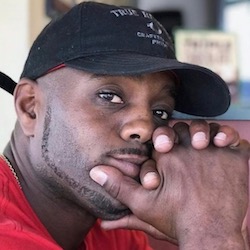 Demetrius Johnson
Chicago police officer Darryl Daley was one of the first officers to respond to the scene. He was looking for Bryan Johns, also known as “Little D,” whom Daley suspected of being the shooter. Almost immediately, he spotted Johns getting out of a van and arrested him. Daley confiscated a handgun, though it would later be eliminated as the gun used in the shooting.
Johns was arrested, taken to the police station and placed in a lineup. One of the witnesses, Aby Gonzalez, identified him as the gunman. However, Detective Reynaldo Guevara concealed the report of this lineup and Johns was released from custody.
The report remained hidden in police files for 27 years.
Six weeks after the shooting, Guevara arrested 15-year-old Demetrius Johnson and charged him with first-degree murder and first-degree attempted murder.
Despite the testimony of several witnesses that they were with Johnson at home at the time of the shooting watching the Chicago Bulls win their first NBA championship, Cook County Circuit Court Judge Thomas Cawley convicted Johnson on November 23, 1992 of both charges and sentenced him to 25 years in prison.
At the trial, three witnesses identified Johnson as the gunman. All had identified Johnson in a live lineup after Guevara showed them an individual photograph of Johnson.
Jack Carey, a Cook County public defender initially assigned to defend Johnson, became a defense witness after he interviewed one of the three eyewitnesses, Rosa Burgos. Carey testified that Burgos told him that three people identified someone as the gunman in a lineup on the night of the shooting, but the detectives said that the person they identified was not the gunman. Carey said she told Guevara when she saw the lineup six weeks later with Johnson that Johnson looked like the gunman, but she wasn’t sure.
Guevara was called as a defense witness but denied that anyone had identified Johns as the gunman on the night of the shooting.
The defense argued that Johns and Johnson resembled each other, and that the alibi testimony was reliable because the night of the Chicago Bulls victory was memorable in Chicago. The prosecution argued that Burgos’s claim that someone else had been identified the night of the shooting was not credible, and that the defense witnesses had concocted a false alibi for Johnson.
Johnson’s appeals were denied. He also filed a post-conviction motion in 1996, without a lawyer, in which he claimed that Johns admitted to him that Johns had been the gunman. That motion was also denied.
In October 2004, Johnson was released on parole.
In 2011, Jacques Rivera was exonerated of a 1988 murder in Chicago after the witness who identified Rivera at trial recanted and said that Detective Guevara had coerced him to falsely identify Rivera. In 2012, Rivera filed a federal lawsuit against Guevara and other officers of burying evidence and coercing the witness to testify falsely. Rivera was the second person to be falsely convicted based on Guevara’s misconduct. In February 2004, Juan Johnson was acquitted at a retrial after his 30-year prison term was vacated. He later would win $21 million in damages from the city of Chicago based on evidence that the original three eyewitnesses recanted their testimony and said they were coerced by Guevara to falsely identify Johnson. The lawsuit was later settled for $16.4 million.
As the Rivera civil case moved toward a trial, the city of Chicago turned over many police homicide files to Rivera’s lawyers, who were alleging that Guevara and other officers had a longstanding practice of concealing evidence favorable to defendants. Michael Brasfield, a retired police chief from Ft. Lauderdale, Florida who had become a private consultant, compared the police files turned over with the prosecution files in the same cases.
Among the police files was a report from Johnson’s case revealing the existence of the lineup conducted on the night of the shooting. The report showed what Johnson’s defense lawyers had long believed—that Johns had been identified that night as the gunman and then was inexplicably released. Not only had Burgos had been telling the truth when she told Johnson’s lawyer, Jack Carey, that Johns had been identified, but also Guevara had lied when he denied there was a lineup on the night of the shooting.
The records, however, were kept secret by a protective order filed in the civil lawsuit. The records finally became public when they were presented as an exhibit at Rivera’s civil trial.
In June 2018, the jury in Rivera’s trial awarded him $17.175 million in damages.
The tally of wrongly convicted defendants as a result of Guevara’s misconduct had grown over the years. In January 2019, Geraldo Iglesias was exonerated of a 1993 murder for which he had been sentenced to 35 years in prison. He was the fourteenth person exonerated based on Guevara’s misconduct.
In September 2019, lawyers for the Exoneration Project at the University of Chicago Law School filed a petition seeking to vacate Johnson’s conviction.
“Detective Guevara’s false police report, his false testimony, and his lies were fraudulently concealed from Johnson from the time of his July 1991 arrest through his trial and ultimately through his release from prison in 2004 until today,” the petition said.
In November 2019, the Cook County State’s Attorney’s Office agreed to vacate Johnson’s convictions, but simultaneously said the office intended to retry him. However, on December 20, the office dismissed the charges. Johnson was the fifteenth person exonerated based on Guevara’s misconduct.
Others exonerated based on Guevara’s misconduct include Jose Montanez, Armando Serrano,
Roberto Almodovar, William Negron
, Jose Maysonet, Arturo DeLeon-Reyes, Gabriel Solache, Thomas Sierra, Ariel Gomez, Ricardo Rodriguez, and Robert Bouto.
In July 2020, Johnson filed a federal civil rights lawsuit seeking compensation for his wrongful conviction. He also was awarded a certificate of innocence from the state of Illinois, and in 2021 received $239,306 in state compensation for his wrongful conviction.
– Maurice Possley
|